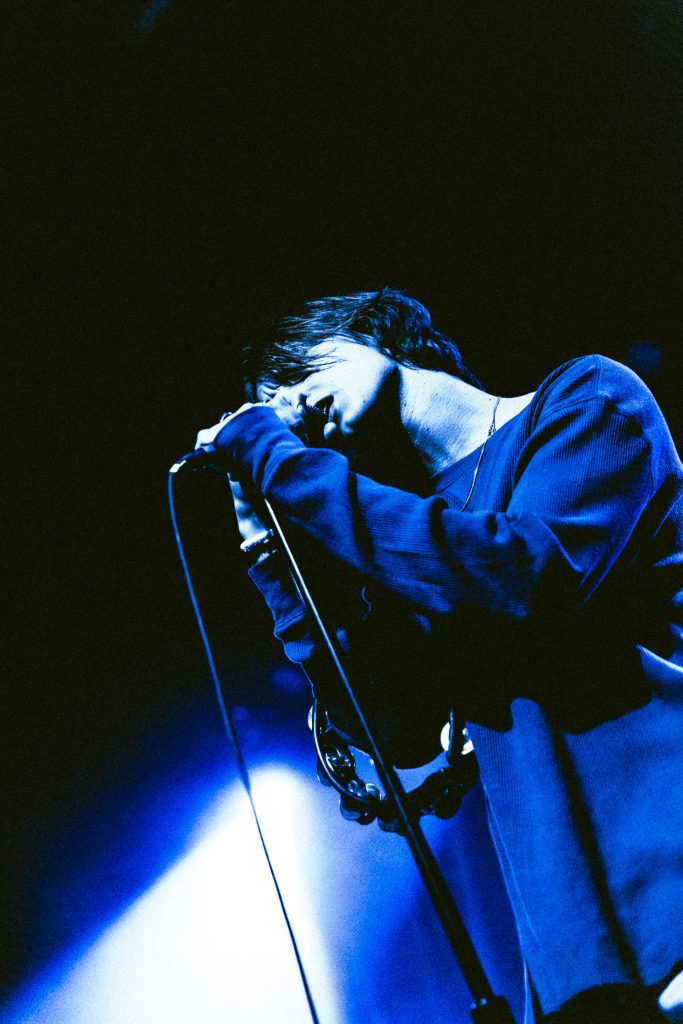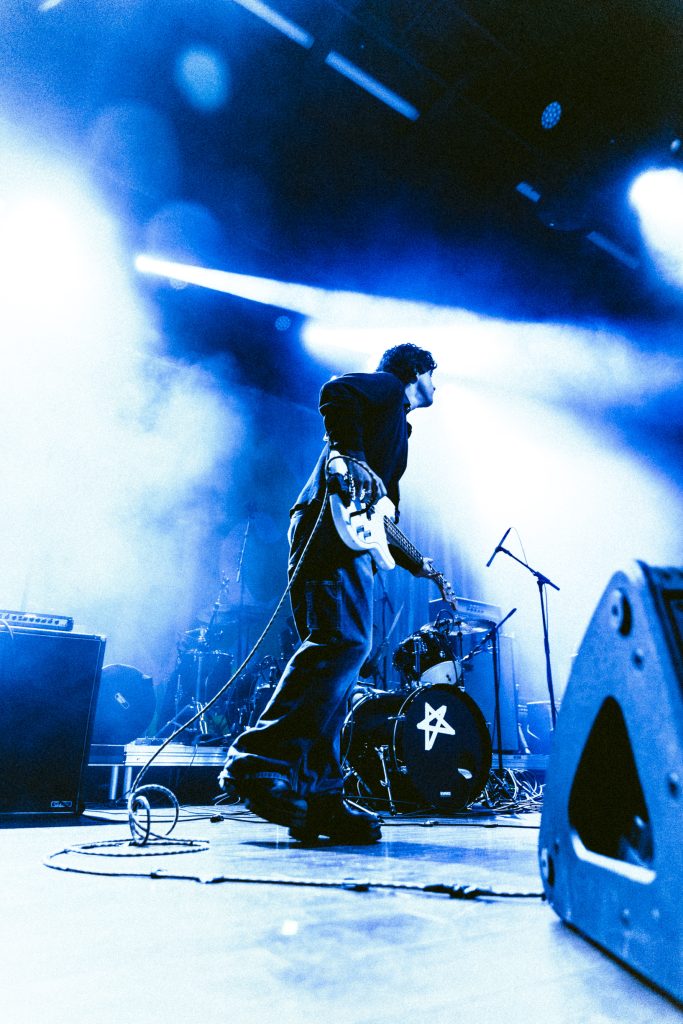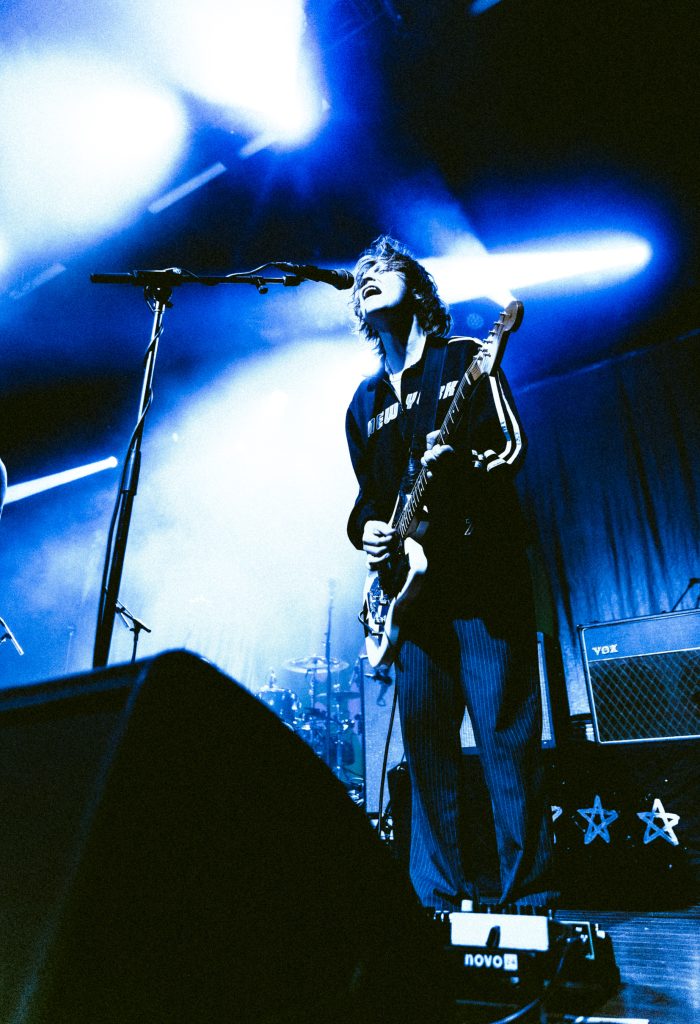New York-based band Been Stellar has been making waves in the industry as of late with a post-punk sound that returns listeners to the grimy garage shows of the ‘90s. Though they’ve been putting out music since 2020, the group just released their debut album Scream From New York, NY back in June and it has already made its way onto many “Best of 2024” lists. Scream From New York, NY features a rawness unlike anything else I’ve heard in recent years and undoubtedly marks the start of an incredible career for the young group.
Been Stellar was rocketed into the touring world following the pandemic and since then they’ve been around the block several times with bands like The 1975, Beebadobee, and even Interpol. The group is currently tailing another industry powerhouse, Fontaines D.C., around the country and I had the chance to sit down with the Been Stellar creative hivemind, aka Sam Slocum and Skyler Knapp, in Minneapolis to discuss their growth, artistic image, and of course, New York City.
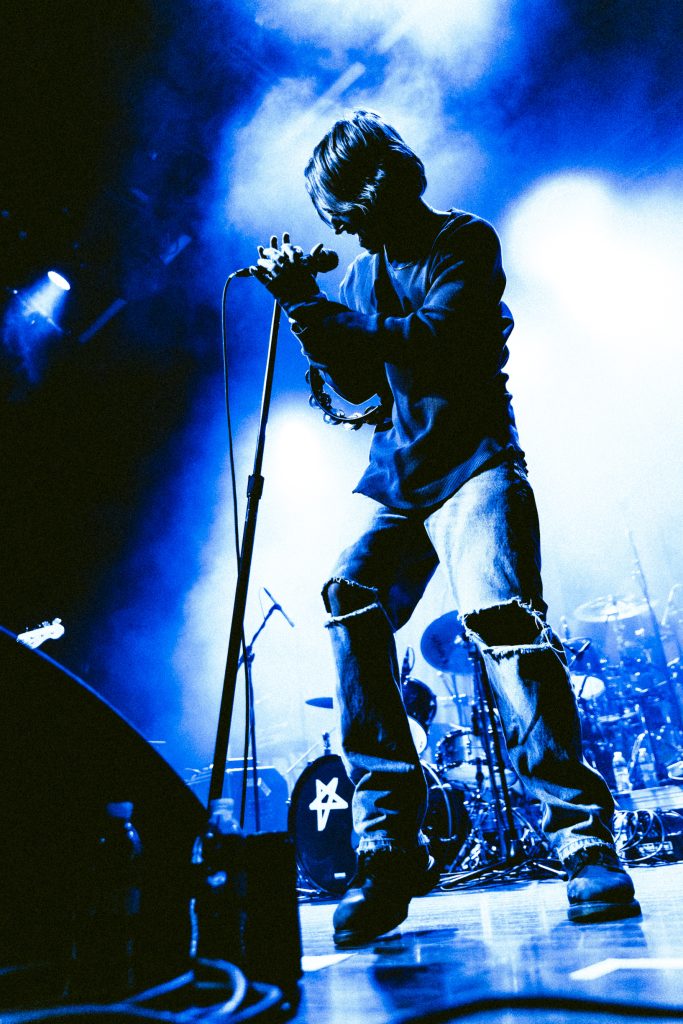
Hi y’all! Thanks for sitting down with me. To start off, I want to go back to the beginning of Been Stellar. I was looking through your discography and noticed that the first song you ever released was back in 2020. During that time, many artists blew up due to the public being more active on social media platforms. Putting yourself out there for the first time as a band during the pandemic was risky. It seems to have paid off, though, as just a few months later, you started on your first tour. How did the pandemic influence you as a band? Was the world being shut down helpful to your writing process or your development as a group?
Skylar: Yeah, I would say it was definitely very helpful. Before the pandemic, we just focused on getting better shows in New York, but we weren’t spending that much time getting our own sound developed. The pandemic really let us reevaluate what it was that we were trying to do. Individually, we also had to recommit to using music as a way to spend a lot of time because, you know, with shows being gone for what seemed like the foreseeable future, it was a lot of just sitting around with a guitar by yourself, which is not as fun. So it was kind of like, “What? Why am I doing this anymore?” I think we all kind of realized that we just wanted to start making better music, regardless of whether or not we’d be part of a scene, or the New York circuit, or anything like that.
Throughout your time as a group, I’ve noticed that everything down to your Instagram feed is incredibly curated and artistic. Who leads that creative direction? As a photographer myself, I always like to ask if there is some method to the madness behind it?
Skylar: It’s the two of us. The visual thing is kind of something that has become more important to us over time because we used to be very bad at it. Neither of us grew up as art kids, so I always kind of thought that I was just bad at art, visual arts at least. I kind of just gave up on it at a certain point, but we kept reaching this hurdle where we would try to work with other people on developing T-shirts and stuff like that and it would never be what we wanted. I think at a certain point we realized that it was because we actually do have an idea of what we want stuff to look like. Then we just had to figure out a way of using our very limited amount of skills, our very rudimentary Photoshop and physical art skills, to make something that we could get behind.
Sam: I have a pretty basic, small toolbox of things that I know how to do on the computer, but we do a lot of physical stuff, like a lot of scanning and working with textures and just making things feel organic in that way. Our visual stuff and that process are tied to what we do with the music itself because we don’t record in the box that much anymore. We do a lot of stuff on tape. Up until we’re in the studio, everything’s just a voice memo. We don’t do demos or anything. I think it’s the same idea with the design side of things; it’s more organic when things are created slowly and by hand. Almost all of our stuff is made on actual paper, and all of the writing is Sky’s handwriting, and we just go in and put extra things in at the end. We have a really good working relationship in that way. We always kind of know what we want and we work together to adjust each others’ work so that we come out with the thing that we want.
Skylar: I also think our curation was a kind of reaction to a lot of bands at the time; right during and right after the pandemic it wasn’t cool to have a curated image for yourself. It was a lot of people taking selfies in the van, but in the past couple of years being curated has become “cool” again. Of course, now people have started being more clunky about it, so I feel like it’s going to swing the other way again, where it’s gonna be kind of lame to be curated, but thank you for acknowledging that. That’s something we put a lot of work and time into.
I think that it’s super cool and important for a band to have such an artistic image. You guys also have those tour diaries that you have been doing. What’s the story with those?
Sam: We’ve wanted to do those diaries for a few tours, but we just hadn’t gotten around to it. Skylar really pushed it over the edge and this time he’s made it happen. It’s so tough when you’re touring at this level and you’re in the opening spot. It’s a really weird dichotomy because we’re driving ourselves, we’re working merch, we’re settling up at the end of the night and everything, and then on top of all of that, when we’re in the van, we’re writing and scanning in a whole tour diary with a photo on top. It’s a lot.
Skylar: I think the reason why we wanted to start doing the diaries is because it’s honestly really funny how absurd it is to tour in this position and at this level. I objectively think it’s kind of an interesting situation, and people don’t really talk about it that much. It’s kind of always like a thing where you’ll see a band post, “We’re in Minneapolis tonight!”, and then nothing else. It’s like, what the hell happened? Even as a fan of music, that’s something I wish I could be able to see more.
Sam: Yeah. I also think the biggest thing is that fans and artists are way too mysterious about things. I love how he writes those out because they feel super candid, and I think bands and artists should be a lot more transparent because it’s all just smoke and mirrors. To some degree, that’s good because I think the spectacle is important, and I think you want to look professional, but at the same time it’s a balance of being real.
Skylar: I agree with that, definitely, especially with the Tiktok age and everything I feel like I know too much about some people.
I definitely appreciate the balance you guys have.
Sam: I made this Tiktok the other day where it’s just us filling up on gas, that’s literally all it is, a video of us getting gas.
That’s sick though, it still looks interesting as a viewer.
Sam: It’s still a little bit of an aesthetic, but it’s just like, “Okay, they’re just getting gas”. There’s another one too where it’s just us driving and listening to the Replacements.
I love it. It’s so real, and it’s great. Okay, next question. Y’all played Lollapalooza for the first time this year and were among an incredible lineup of influential artists. What was that experience like to play such an iconic and important festival? I know for a lot of groups, especially at least in the Midwest scene, a Lolla appearance marks the feeling of “making it”. Do you feel that way as well and if not, when will you feel as though you’ve made it, if ever?
Skylar: To be honest, it didn’t really feel like that for us.
Sam: We never feel that.
Skylar: I mean, yeah, it was a sick festival. There were a lot of people there to see us, which was really surprising and really cool, but, yeah, I don’t know. Not to sound ungrateful or jaded or whatever, but we’re so well acquainted with the reality of what’s behind “making it”, it’s hard to feel that way. People told us when we signed our record deal like, “Okay, you guys are good now”, like, “You’re on the entrance ramp to the highway” or whatever, but it doesn’t really change much on a very practical level, even though it was a very important thing. You know, it’s not like we’re making any more money or anything like that. So yeah, it felt cool to reach a milestone that I never thought I’d get to, but the stuff that actually feels like, “Okay, cool, we’re making it”, is when we make a really good song, you know?
Sam: Our parents were there and they definitely had that feeling though because we’re from the Midwest too, originally. We’re both from Michigan, like a five-hour drive from Chicago, so our parents came and I think they have that feeling more than we do. If you look at it from the outside, it looks like we’re getting somewhere and like we’re not “wasting our time”.
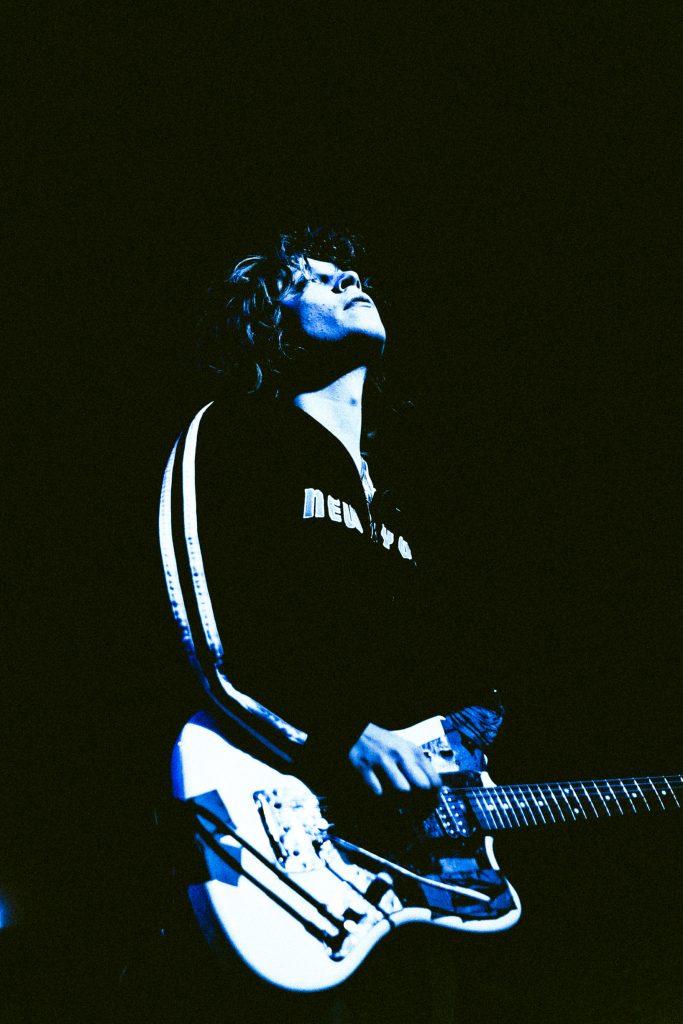
Yeah, I definitely get that. Next question: New York City is well-known as one of the biggest musical and cultural hubs in the world. You nod to it many times throughout your discography, but how has living there influenced your music style, your growth as a band, or even just you as individuals?
Skylar: New York is like the thing that brought us together because, yeah, as Sam said, none of us grew up in the city. We all grew up all over and to some extent, it was kind of like a built-in thing that we were always wanting to talk about because it was this crazy new foreign place and we were all discovering it together. It kind of served as inspiration from the get-go.
Also, it’s kind of impossible to have any sort of ego or anything like that in New York because everyone’s better than you at everything all the time. Like, Sam and I thought we were really good at making songs when we came to New York, then we got there, and it’s like, “Oh God, these are actually bad, and everyone else is so much better”. I like that aspect of it, though, because in the creative sphere, there are always people doing stuff that’s cooler than you or that’s more innovative than you. There are two ways that you can respond to that. One way is you can roll over and die because you’re focusing so much on what everybody else is doing that you lose track of what you should be doing. That’s the wrong way to go, but I think we did that for a while early on when we were in college. You see all of these very artistic people all of a sudden, and you’re like, “Oh my God. I need to be doing things that way”, but the real way to respond to that is to look at those people, look at what they’re doing right, and then apply it to your own thing. You just have to try harder, work harder, and focus on your own craft. In the last two years, we’ve figured that out and rediscovered our love for our artistic statement. I’d say that New York is a really special place. It’s a place that imposes itself on you because it’s so abrasive and obtrusive that you can’t escape it.
Sam: It’s like someone just constantly yelling in your ear, “You’re in New York”. Like, you’re going to work or whatever and taking the train and you’ll just see something that’s so very specific to the place that it’s hard not to think about where you are. Growing up in Michigan, I would never really think about Michigan much, but when you are in New York, you can’t escape that thought.
Tying into that concept, your debut album, Scream From New York, NY, dropped recently and I’ve had it on repeat ever since. I noticed that it likely takes some inspiration from Nirvana and Radiohead, but includes a super unique garage rock spin that I absolutely love. Is there anything or anyone that was super influential in its development?
Sam: Our producer, Dan, was instrumental to that because he likes things very raw and very abrasive. The raw stuff is actually kind of what we were trying to get away from on this album, like we wanted it to sound pretty clean, but it ended up being really abrasive. I’m happy about that, though, because I think it’s kind of what it was supposed to be.
Skylar: Yeah, Dan just wants things to remain the same way that you would listen to it if you were seeing the band play live, which ended up being exactly the way that the record needed to sound. So yeah, I’d say he was probably the biggest influence.
Okay, super fast last question, what is one Ben Steller song that you would recommend to a new listener, and why?
Skylar: I think I would have to say the last song on the album called, “I Have the Answer”. It’s probably our collective favorite, and I’d say it’s a song that we’ve been trying to write for a while that we haven’t been able to do up until now. It’s kind of at the core of who we are as a band.
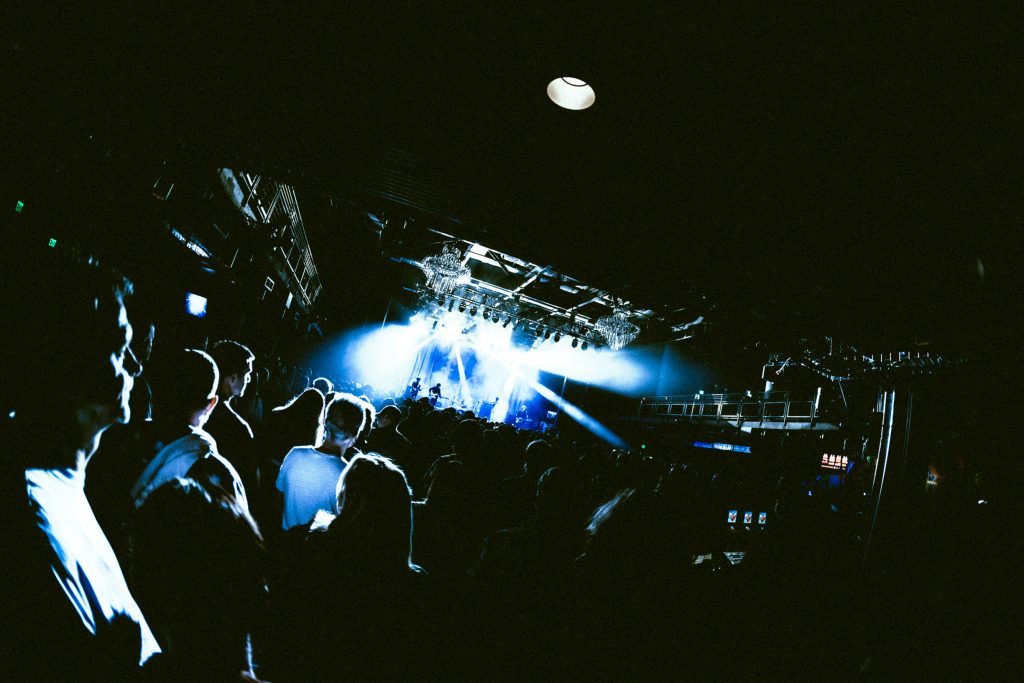
Been Stellar still has a few dates left with Fontaines D.C. before they embark on their European Headline tour in November. Catch them while you can!
